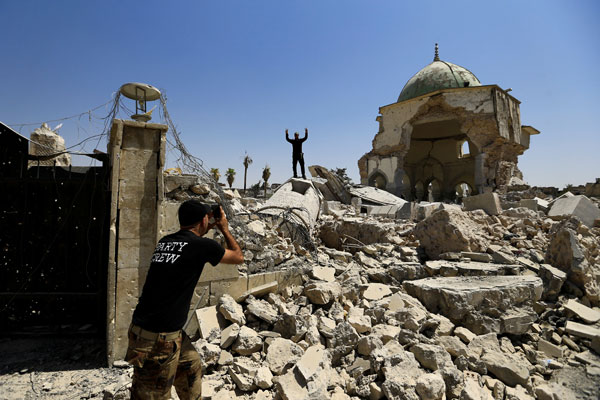After IS, Mosul rebuilds mosques and monuments
(China Daily) Updated: 2017-07-27 06:50MOSUL, Iraq - Faisal Jeber arrested and interrogated suspected Islamic State militants during the battle for Mosul. Now he is taking up a new fight that could be just as crucial to the city's future.
The 47-year-old geologist is trying to restore historical sites damaged during the extremist group's brutal three-year rule over the northern Iraqi city.
By piecing back together buildings which he says gave Mosul its soul and identity before the war, Jeber hopes also to help rebuild its social fabric.
But the city's renaissance could take a generation, if it happens at all, he says, and it is uncertain how Mosul and other Iraqi towns and cities recaptured by government forces will look afterward.
How Mosul's identity is reconstituted will help determine whether Iraqi leaders can pacify a country dogged by extremists for the past decade.
"The IS tried hard to destroy Mosul's identity by demolishing everything and making it monochrome," Faisal said. "I am using this to unite my city and then maybe the whole country."
Before the war, Mosul was Iraq's second-largest city, known for its diversity, religious conservatism and nationalism. After the US-led invasion that toppled Saddam Hussein in 2003, it became a base for al-Qaida and the insurgency.
Since IS seized Mosul in 2014 in the face of the Iraqi army's collapse, the militants have blown up monuments, evicted communities that had lived together for centuries and turned neighbors against each other.
Following the group's defeat in Mosul this month in a US-backed offensive, billboards have gone up on a main road hailing the city as the cradle of civilization and showing landmarks dating back to the days of Mesopotamia.
It is, Jeber says, a unique moment to rebuild Mosul's multicultural identity and combat radical Islamism.
"It's an opportunity and it's just the right time to do it because if you talked to any Mosulawi about that before (IS), nobody would accept it. But now people came out of a radical Muslim experience, they are in shock," he said.
"Either we do it this year and we use this opportunity or else we lose it forever. We have a very narrow window."
Jeber wants to start rebuilding at the site of the Mosque of the Prophet Jonah, which was constructed on top of a Christian monastery. The site marks Jonah's mythical burial place and also contains the remains of a Zoroastrian temple and an Assyrian palace.
"The site is four levels of civilization," he explained during a visit to the site this month.
IS blew up the mosque and dug tunnels in search of valuable antiquities, destabilizing the base.
Muslim clerics want to rebuild the site as a mosque. One has already set a cornerstone but Jeber says that restoring it as a heritage site honoring its multiple historical identities would do much more to turn the page on IS.
There is, however, no guarantee Mosul will be the same as it was before IS arrived.
Reuters
 |
|
People take photos in front of the ruins of Grand al-Nuri Mosque in the Old City of Mosul, Iraq, on July 20. THAIER AL-SUDANI/REUTERS |
- 'Cooperation is complementary'
- Worldwide manhunt nets 50th fugitive
- China-Japan meet seeks cooperation
- Agency ensuring natural gas supply
- Global manhunt sees China catch its 50th fugitive
- Call for 'Red Boat Spirit' a noble goal, official says
- China 'open to world' of foreign talent
- Free trade studies agreed on as Li meets with Canadian PM Trudeau
- Emojis on austerity rules from top anti-graft authority go viral
- Xi: All aboard internet express











